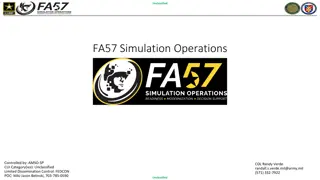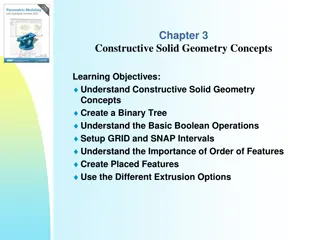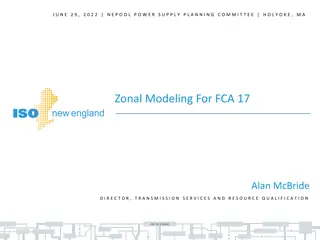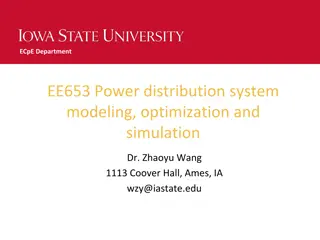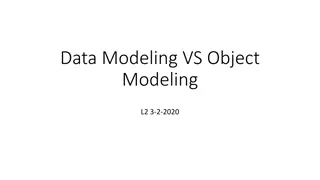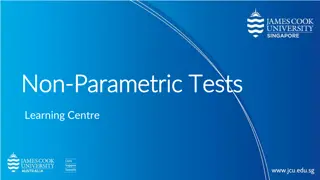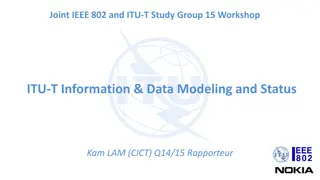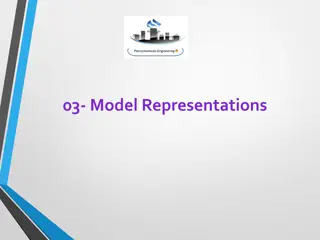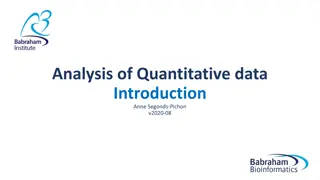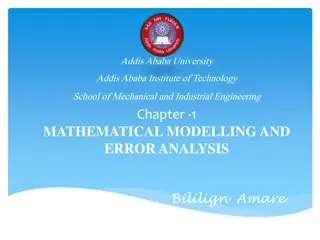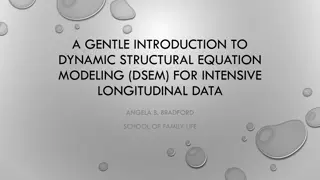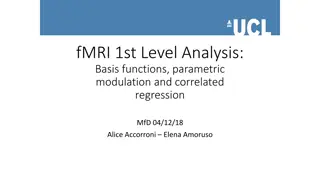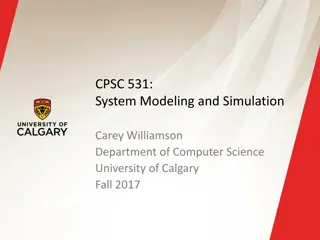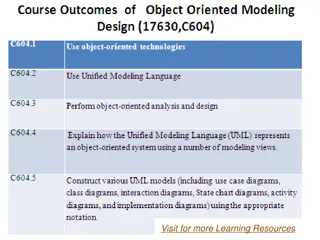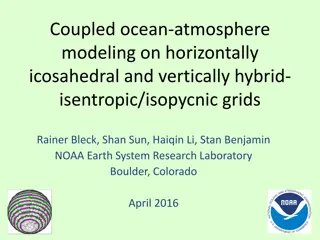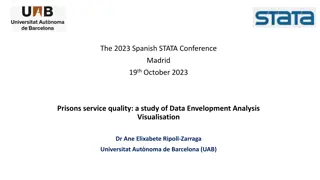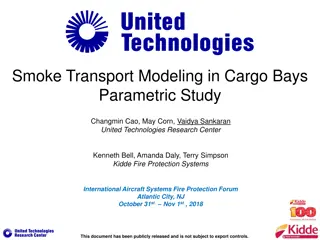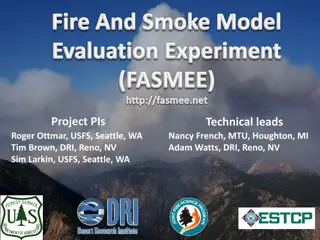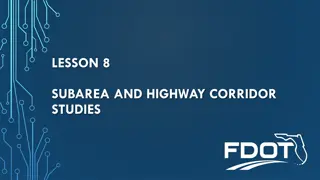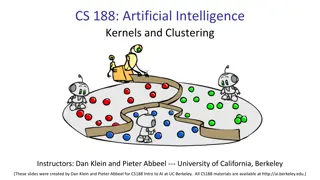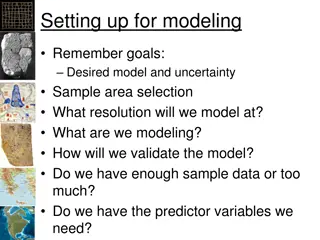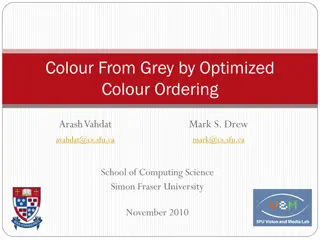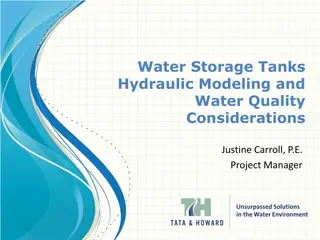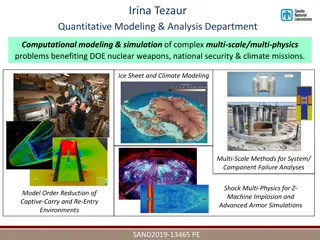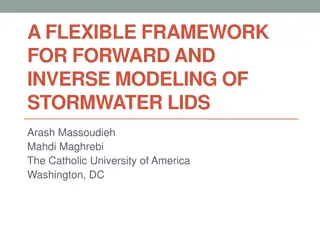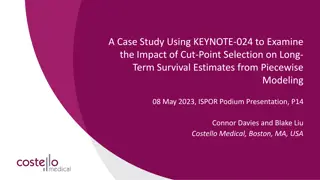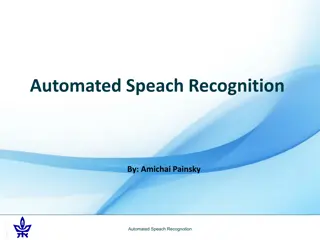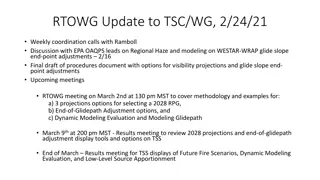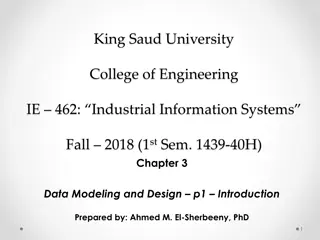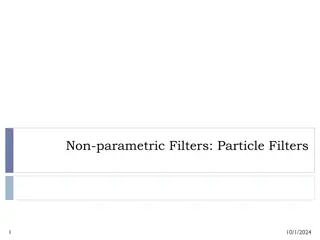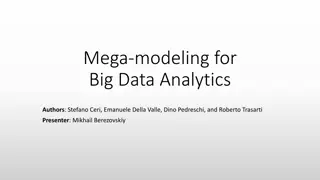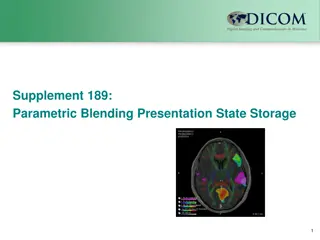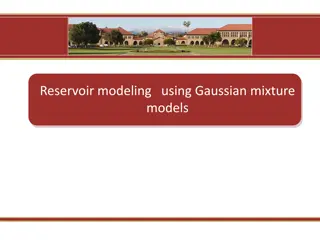Overview of Army Modeling and Simulation Office
The U.S. Army Modeling and Simulation Office (AMSO) serves as the lead activity in developing strategy and policy for the Army Modeling and Simulation Enterprise. It focuses on effective governance, resource management, coordination across various community areas, and training the Army Analysis, Mod
1 views • 8 slides
Understanding Constructive Solid Geometry Concepts
Explore Constructive Solid Geometry (CSG) concepts including binary tree representation, Boolean operations, base feature selection in parametric modeling, and the importance of order in feature creation. Learn about CSG's role in representing solid models and its applications in the field of solid
1 views • 13 slides
Capacity Zone Modeling for Forward Capacity Auction 17 Results
This presentation unveils the Capacity Zone modeling calculations for Forward Capacity Auction 17 associated with the 2026-2027 Capacity Commitment Period by ISO-NE PUBLIC. It delves into boundary definitions, import-constrained zone modeling, and market rules guiding the assessments and modeling pr
0 views • 16 slides
Distribution Feeder Modeling and Analysis Overview
This document delves into the modeling, optimization, and simulation of power distribution systems, specifically focusing on Distribution Feeder Modeling and Analysis. It covers the components of a typical distribution feeder, series components, Wye-Connected Voltage Regulator modeling, and equation
0 views • 14 slides
Understanding Data Modeling vs Object Modeling
Data modeling involves exploring data-oriented structures, identifying entity types, and assigning attributes similar to class modeling in object-oriented development. Object models should not be solely based on existing data schemas due to impedance mismatches between object and relational paradigm
0 views • 17 slides
Understanding Non-Parametric Tests and Their Applications
Non-parametric tests serve as valuable alternatives to parametric tests when data do not meet specific criteria. This article explores the concept of non-parametric tests, types of non-parametric tests, and provides insights on conducting the Mann-Whitney U Test using SPSS for practical research app
4 views • 32 slides
Evolution of Modeling Methodologies in Telecommunication Standards
Workshop on joint efforts between IEEE 802 and ITU-T Study Group 15 focused on information modeling, data modeling, and system control in the realm of transport systems and equipment. The mandate covers technology architecture, function management, and modeling methodologies like UML to YANG generat
1 views • 16 slides
Understanding Geometric Modeling in CAD
Geometric modeling in computer-aided design (CAD) is crucially done in three key ways: wireframe modeling, surface modeling, and solid modeling. Wireframe modeling represents objects by their edges, whereas surface modeling uses surfaces, vertices, and edges to construct components like a box. Each
1 views • 37 slides
Understanding Statistical Inference and Significance in Quantitative Data Analysis
Explore the key concepts of statistical inference, null hypothesis, error types, and the signal-to-noise ratio in quantitative data analysis. Learn about choosing the correct statistical test based on data assumptions, such as parametric tests with specific requirements and non-parametric tests. Gai
0 views • 12 slides
Mathematical Modeling and Error Analysis in Engineering
Mathematical modeling plays a crucial role in solving engineering problems efficiently. Numerical methods are powerful tools essential for problem-solving and learning. This chapter explores the importance of studying numerical methods, the concept of mathematical modeling, and the evaluation proces
0 views • 10 slides
Understanding Chi-Square Test in Statistics
Karl Pearson introduced the Chi-Square (X2) test for statistical analysis to determine experimental consistency with hypotheses. The test measures the agreement between actual and expected counts under the null hypothesis, making it a non-parametric test. It can be applied to various types of variab
6 views • 28 slides
Introduction to Dynamic Structural Equation Modeling for Intensive Longitudinal Data
Dynamic Structural Equation Modeling (DSEM) is a powerful analytical tool used to analyze intensive longitudinal data, combining multilevel modeling, time series modeling, structural equation modeling, and time-varying effects modeling. By modeling correlations and changes over time at both individu
0 views • 22 slides
Understanding Non-Parametric ROC Analysis in Diagnostic Testing
Non-parametric ROC analysis is a crucial method in diagnostic testing to determine the performance of binary classification tests in distinguishing between diseased and healthy subjects. This analysis involves evaluating sensitivity, specificity, positive predictive value, and negative predictive va
10 views • 22 slides
Understanding fMRI 1st Level Analysis: Basis Functions and GLM Assumptions
Explore the exciting world of fMRI 1st level analysis focusing on basis functions, parametric modulation, correlated regression, GLM assumptions, group analysis, and more. Dive into brain region differences in BOLD signals with various stimuli and learn about temporal basis functions in neuroimaging
0 views • 42 slides
System Modeling and Simulation Overview
This content provides insights into CPSC 531: System Modeling and Simulation course, covering topics such as performance evaluation, simulation modeling, and terminology in system modeling. It emphasizes the importance of developing simulation programs, advantages of simulation, and key concepts lik
0 views • 28 slides
Understanding Object Modeling in Software Development
Object modeling is a crucial concept in software development, capturing the static structure of a system by depicting objects, their relationships, attributes, and operations. This modeling method aids in demonstrating systems to stakeholders and promotes a deeper understanding of real-world entitie
1 views • 65 slides
Creating Coordinate Systems in Creo Parametric
Learn how to create a coordinate system in a specific location and orientation within a Creo Parametric assembly. Follow step-by-step instructions to set external references, activate the desired widget, and redefine the coordinate system without external dependencies. Enhance your design process by
0 views • 11 slides
Coupled Ocean-Atmosphere Modeling on Icosahedral Grids
Coupled ocean-atmosphere modeling on horizontally icosahedral and vertically hybrid-isentropic/isopycnic grids is a cutting-edge approach to modeling climate variability. The design goals aim to achieve a global domain with no grid mismatch at the ocean-atmosphere interface, with key indicators such
1 views • 21 slides
Efficiency Methodological Approaches in Prisons Service Quality Study
Exploring efficiency methodologies in analyzing prisons service quality, this study focuses on parametric and non-parametric approaches such as Data Envelopment Analysis (DEA) and Stochastic Frontier Analysis (SFA). It delves into benchmarking techniques, productivity analysis, and the implications
0 views • 21 slides
Parametric Study on Smoke Transport Modeling in Cargo Bays
Explore the parametric study conducted by researchers on smoke transport modeling in cargo bays. The study focuses on developing a model-based tool for designing cargo bay detection systems to streamline the certification process. Key components and motivations for characterizing smoke generators ar
0 views • 12 slides
Fire and Smoke Modeling Evaluation Effort (FASMEE) Overview
FASMEE is a collaborative project aimed at assessing and advancing fire and smoke modeling systems through critical measurement techniques and observational data. Led by key technical leads, FASMEE focuses on diverse modeling areas such as fire growth, effects, coupled fire-atmosphere behavior, smok
5 views • 30 slides
Subarea and Highway Corridor Studies: Travel Demand Modeling and Refinements
In this lesson, we delve into subarea and corridor studies focusing on travel demand model refinements, highway network coding, corridor congestion relief, and trip assignment theory. Subarea modeling plays a crucial role in forecasting travel within smaller regions with detailed traffic patterns, t
1 views • 45 slides
Introduction to Artificial Intelligence Kernels and Clustering at UC Berkeley
Explore the world of Artificial Intelligence through CS188 course slides by Dan Klein and Pieter Abbeel at the University of California, Berkeley. Dive into topics like Case-Based Learning, Nearest-Neighbor Classification, Parametric vs. Non-Parametric models, Similarity Functions, and more. Discove
0 views • 41 slides
Essential Steps for Setting up a Modeling Study
Ensure clarity on modeling goals and uncertainties. Select sample areas strategically based on interest and available data. Determine appropriate resolution for modeling. Define variables to model and validate the model effectively. Assess sample data adequacy and predictor variables availability. E
0 views • 9 slides
Optimized Colour Ordering for Grey to Colour Transformation
The research discusses the challenge of recovering a colour image from a grey-level image efficiently. It presents a solution involving parametric curve optimization in the encoder and decoder sides, minimizing errors and encapsulating colour data. The Parametric Curve maps grayscale values to colou
0 views • 19 slides
Water Storage Tanks Hydraulic Modeling and Water Quality Considerations
This presentation by Justine Carroll, P.E., Project Manager, focuses on the hydraulic modeling and water quality considerations related to water storage tanks. It covers topics such as water age evaluation, steady state modeling, extended period simulations, pump controls, demand patterns, EPS verif
0 views • 34 slides
Advancing Computational Modeling for National Security and Climate Missions
Irina Tezaur leads the Quantitative Modeling & Analysis Department, focusing on computational modeling and simulation of complex multi-scale, multi-physics problems. Her work benefits DOE nuclear weapons, national security, and climate missions. By employing innovative techniques like model order re
0 views • 6 slides
Flexible Framework for Stormwater Lids Modeling
A new flexible framework for forward and inverse modeling of stormwater lids is presented. It includes governing equations, hydraulic and contaminant transport, numerical methods, and demonstration cases for various green infrastructure components. The importance of different processes in modeling i
0 views • 20 slides
Impact of Cut-Point Selection on IO Survival Estimates
Using KEYNOTE-024 as a case study, this presentation examines the impact of cut-point selection on long-term survival estimates from piecewise modeling in immuno-oncology therapies. It explores the uncertainty in IO survival extrapolations and the use of piecewise survival models as a flexible alter
0 views • 22 slides
Sustainability and Organic Livestock Modeling for Global Food Security
The research presented at the 18th Organic World Congress in Istanbul delves into the Sustainability and Organic Livestock (SOL-m) modeling approach developed by FAO and FiBL. The study aims to explore the potential impacts of global conversion to organic livestock production by 2050 on food securit
0 views • 25 slides
Understanding Automated Speech Recognition Technologies
Explore the world of Automated Speech Recognition (ASR), including setup, basics, observations, preprocessing, language modeling, acoustic modeling, and Hidden Markov Models. Learn about the process of converting speech signals into transcriptions, the importance of language modeling in ASR accuracy
0 views • 28 slides
Update on Modeling and Coordination Discussions
Weekly coordination calls with Ramboll and discussions with EPA OAQPS leads focused on Regional Haze and modeling adjustments. Final draft of procedures document with visibility projections and glide slope adjustments. Upcoming RTOWG meetings covering methodology, projections, and modeling evaluatio
0 views • 5 slides
Importance of Data Modeling in Industrial Information Systems
Introduction to data modeling and design in Industrial Information Systems at King Saud University College of Engineering. The chapter covers the significance of data modeling, capturing data characteristics, structural information, and the role of databases and DBMS. Data modeling fills crucial gap
0 views • 51 slides
Understanding Particle Filters in Non-parametric Systems
Particle filters, also known as non-parametric filters, are a powerful tool for state estimation in dynamic systems. These filters represent density using a set of samples drawn from the density, known as particles. Through resampling and reweighting, particle filters track the state of a system ove
0 views • 19 slides
Mega-Modeling for Big Data Analytics
Mega-Modeling is a comprehensive approach that encompasses model construction, evaluation, composition, evolution, and search to address challenges in various areas such as social and economic resilience, health, transportation, and energy management. The pillars of Mega-Modeling include Model-Drive
0 views • 14 slides
Understanding Parametric Blending Presentation State Storage
Explore the concept of Parametric Blending Presentation State Storage, which allows showcasing spatial relationships between parametric maps and structural images while retaining usability. This innovative method involves blending different data sets, applying thresholds, and highlighting important
0 views • 20 slides
NetLogo - Programmable Modeling Environment for Simulating Natural and Social Phenomena
NetLogo is a powerful and versatile programmable modeling environment created by Uri Wilensky in 1999. It allows users to simulate natural and social phenomena by giving instructions to multiple agents operating independently, making it ideal for modeling complex systems evolving over time. NetLogo
0 views • 7 slides
Exploring Parametric and Polar Equations in Calculus
Dive into the world of parametric and polar equations with insights on graphing, tangents, conversions between polar and rectangular coordinates, and finding the area enclosed by polar curves. Discover the power of these mathematical representations in understanding complex curves and functions.
0 views • 6 slides
Overview of Analog Channel Testing and Parametric Analysis
Explore the world of analog channel testing, types of analog channels, AC parametric tests, gain and level testing, and more. Understand the components involved, critical measurements like absolute voltage levels, and ways to detect circuit defects efficiently. Dive into the nuances of AC circuit pe
0 views • 60 slides
Reservoir Modeling Using Gaussian Mixture Models
In the field of reservoir modeling, Gaussian mixture models offer a powerful approach to estimating rock properties such as porosity, sand/clay content, and saturations using seismic data. This analytical solution of the Bayesian linear inverse problem provides insights into modeling reservoir prope
0 views • 10 slides
